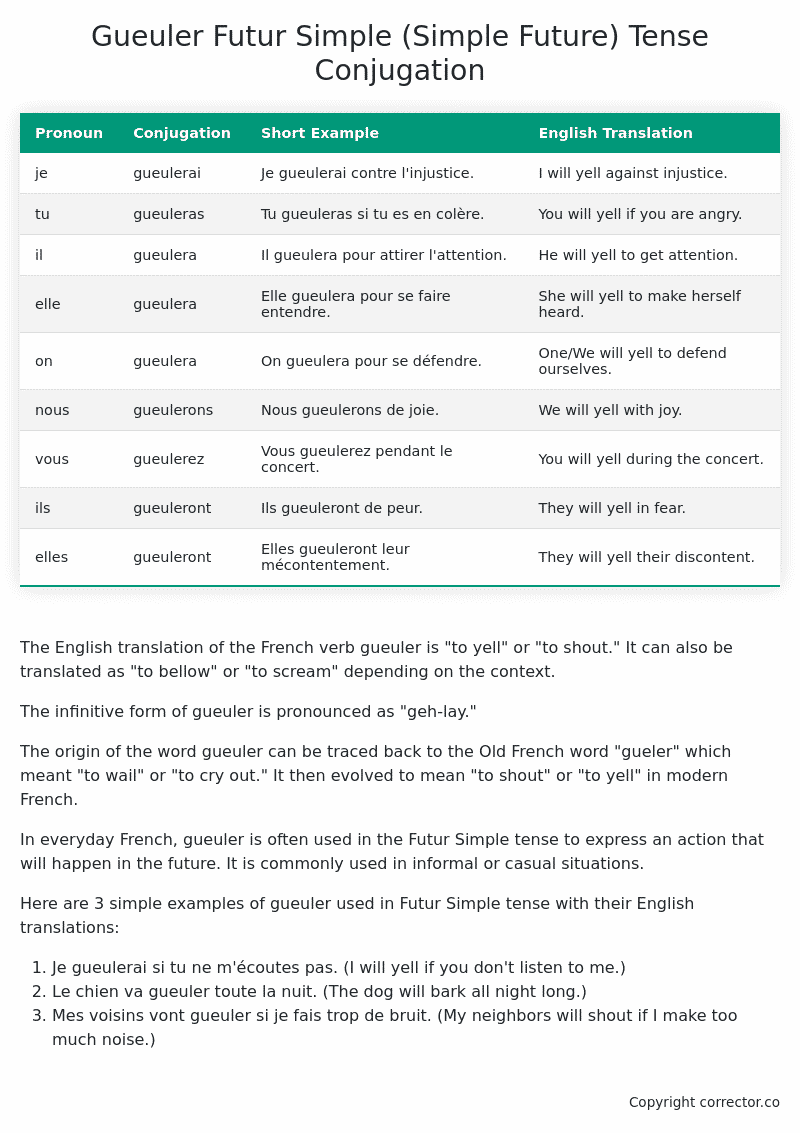Futur Simple (Simple Future) Tense Conjugation of the French Verb gueuler
Introduction to the verb gueuler
The English translation of the French verb gueuler is “to yell” or “to shout.” It can also be translated as “to bellow” or “to scream” depending on the context.
The infinitive form of gueuler is pronounced as “geh-lay.”
The origin of the word gueuler can be traced back to the Old French word “gueler” which meant “to wail” or “to cry out.” It then evolved to mean “to shout” or “to yell” in modern French.
In everyday French, gueuler is often used in the Futur Simple tense to express an action that will happen in the future. It is commonly used in informal or casual situations.
Here are 3 simple examples of gueuler used in Futur Simple tense with their English translations:
- Je gueulerai si tu ne m’écoutes pas. (I will yell if you don’t listen to me.)
- Le chien va gueuler toute la nuit. (The dog will bark all night long.)
- Mes voisins vont gueuler si je fais trop de bruit. (My neighbors will shout if I make too much noise.)
Table of the Futur Simple (Simple Future) Tense Conjugation of gueuler
| Pronoun | Conjugation | Short Example | English Translation |
|---|---|---|---|
| je | gueulerai | Je gueulerai contre l’injustice. | I will yell against injustice. |
| tu | gueuleras | Tu gueuleras si tu es en colère. | You will yell if you are angry. |
| il | gueulera | Il gueulera pour attirer l’attention. | He will yell to get attention. |
| elle | gueulera | Elle gueulera pour se faire entendre. | She will yell to make herself heard. |
| on | gueulera | On gueulera pour se défendre. | One/We will yell to defend ourselves. |
| nous | gueulerons | Nous gueulerons de joie. | We will yell with joy. |
| vous | gueulerez | Vous gueulerez pendant le concert. | You will yell during the concert. |
| ils | gueuleront | Ils gueuleront de peur. | They will yell in fear. |
| elles | gueuleront | Elles gueuleront leur mécontentement. | They will yell their discontent. |
Other Conjugations for Gueuler.
Le Present (Present Tense) Conjugation of the French Verb gueuler
Imparfait (Imperfect) Tense Conjugation of the French Verb gueuler
Passé Simple (Simple Past) Tense Conjugation of the French Verb gueuler
Passé Composé (Present Perfect) Tense Conjugation of the French Verb gueuler
Futur Simple (Simple Future) Tense Conjugation of the French Verb gueuler (this article)
Futur Proche (Near Future) Tense Conjugation of the French Verb gueuler
Plus-que-parfait (Pluperfect) Tense Conjugation of the French Verb gueuler
Passé Antérieur (Past Anterior) Tense Conjugation of the French Verb gueuler
Futur Antérieur (Future Anterior) Tense Conjugation of the French Verb gueuler
Subjonctif Présent (Subjunctive Present) Tense Conjugation of the French Verb gueuler
Subjonctif Passé (Subjunctive Past) Tense Conjugation of the French Verb gueuler
Subjonctif Imparfait (Subjunctive Imperfect) Tense Conjugation of the French Verb gueuler
Subjonctif Plus-que-parfait (Subjunctive Pluperfect) Tense Conjugation of the French Verb gueuler
Conditionnel Présent (Conditional Present) Tense Conjugation of the French Verb gueuler
Conditionnel Passé (Conditional Past) Tense Conjugation of the French Verb gueuler
L’impératif Présent (Imperative Present) Tense Conjugation of the French Verb gueuler
L’infinitif Présent (Infinitive Present) Tense Conjugation of the French Verb gueuler
Struggling with French verbs or the language in general? Why not use our free French Grammar Checker – no registration required!
Get a FREE Download Study Sheet of this Conjugation 🔥
Simply right click the image below, click “save image” and get your free reference for the gueuler Futur Simple tense conjugation!

Gueuler – About the French Futur Simple (Simple Future) Tense
Formation of Futur Simple
For regular -er verbs (e.g., parler – to speak)
For regular -ir verbs (e.g., finir – to finish)
For regular -re verbs (e.g., vendre – to sell)
Common Everyday Usage Patterns
Conditional Statements
Interactions with Other Tenses
Futur Antérieur
Conditional
Present
Summary
I hope you enjoyed this article on the verb gueuler. Still in a learning mood? Check out another TOTALLY random French verb conjugation!


